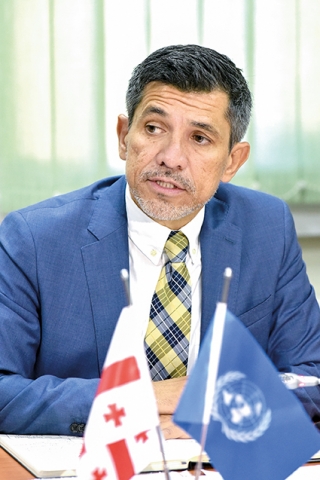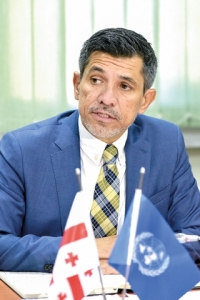UN Expert Assesses Human Rights of LGBT Persons in Georgia
Interview
On Friday October 5, the UN Independent Expert on the Protection against Violence and Discrimination based on Sexual Orientation and Gender Identity, Victor Madrigal-Borloz, gave a press conference in Tbilisi to share the preliminary findings of his official visit to Georgia on 25 September – 5 October.
He noted that the visit was an important opportunity to assess the implementation of existing national and international human rights standards to combat violence and discrimination against lesbian, gay, bisexual, and transgender (LGBT) people in the country.
The expert will present his findings and recommendations to the UN Human Rights Council in June 2019.
During the press conference, Madrigal-Borloz thoroughly elaborated on the details of his report, the conclusions he had made as a result of analyzing the current situation in terms of violation of the rights of LGBT persons, and his recommendations for future steps needing to be taken by the relevant skateholders.
The UN expert commended the commitment of the Georgian government to address violence and discrimination against the LGBT community members, but expressed concern that implementation is falling short of what is urgently needed.
The independent expert positively evaluated the government’s efforts and reforms for improving the lives of LGBT people but noted the situation in Georgia is still quite difficult: beatings are commonplace, harassment and bullying constant, and exclusion from family, education, work and health settings are not unusual.
He also highlighted that LGBT people are particularly vulnerable to violence, ill-treatment and discrimination, many facing it on a daily basis at the hands of individuals, criminal gangs, and even their own families.
“In recent years, the Georgian government has taken significant steps to address the situation of LGBT people, who are among the most discriminated against and vulnerable communities in Georgia,” Madrigal-Borloz said. “The Government of Georgia has already taken the most important step: recognizing the eradication of violence and discrimination as one of its main priorities, and firmly declaring sexual orientation and gender identity as protected grounds. I encourage the authorities to continue along this path; I am convinced that respect, peaceful coexistence and tolerance are cherished Georgian values and I am certain that they will provide a foundation where all Georgians who happen to be gay, lesbian, trans or bisexual will live free and equal.”
Following his 11-day visit to Georgia’s capital Tbilisi, Kutaisi and Batumi regions, Madrigal-Borloz stressed that trans persons, particularly trans women, find it difficult to access State services, a challenge exacerbated by requirements for legal recognition of their gender identity, and disempowerment resulting from a reliance on the opinion of medical doctors, unnecessary in this case.
After the press conference, Mr Madrigal-Borloz gave an interview to select media representatives, including GEORGIA TODAY.
We asked him to elaborate on the importance of his report about the lives of LGBT people in Georgia, his opinion about the work of NGOs operating in this direction and about the most scandalous cases of recent times related to supporting LGBT rights.
When asked about the changes his report might bring to Georgian reality, Madrigal-Borloz expressed hope that it will definitely affect and improve the situation in terms of the violation of LGBT rights, as long as it can be used as an instruction for future actions.
“I hope that my report will be seen as a technical input into what could be a program of action. Some of the actions that I am recommending, for example legal recognition of gender identity, should actually go very far in promoting the rights of trans women.
“The adoption of a policy of zero tolerance in relation to hate speech on the basis of sexual orientation and gender identity, accompanied by the adoption of effective measures of investigation and sanction, should go very far to curtailing hate speech. So, yes, I am hoping that it will bring a very specific change!”
As for the Georgian NGO-s operating to support the rights of LGBT persons and restrict the violence against them, the Independent Expert positively evaluated their work, but stressed that more steps and actions should be taken for better results:
“I think that the work of NGOs is excellent. They demonstrate great quality in their work. The NGOs I’ve met have a very strong value base and are clearly aiming at the right targets and objectives. But they need to be supported more. The international community and all sectors of society should support them more, because I don’t think that they manage to cover all the needs. There are organizations that document hundreds of cases of violence, but my working theory is that there are thousands of cases of violence and there should be more support so that they can actually document them.”
We asked Madrigal-Borloz to express his opinion about the recent scandal related to Georgian footballer Guram Kashia, who wore a rainbow armband in support of LGBT rights and found himself severely criticized by some members of Georgian society; some people even called for him to be stripped of the National Team captaincy.
“First of all, he has my full support. I find it extraordinary when members of the overall community, and particularly public figures, come out in support of a community that is subject to violence and discrimination. It was the right and a brave thing to do. As for the reactions and aggression to it, I think it’s related to misinformation in society. If people work to understand the degree of the violence that goes on against LGBT people, the majority would actually think twice before criticizing somebody who is trying to eliminate such violence. I think we need to make sure that people understand that lesbian, gay, bisexual, and transgender people are in our families, in our neighborhoods, in our schools, and they are people who are getting beaten, getting bullied, and we need to stop that,” he told us.
Victor Madrigal-Borloz, from Costa Rica, took on his role as the UN Independent Expert on the Protection against Violence and Discrimination based on Sexual Orientation and Gender Identity for a three-year period starting on 1 January 2018. He also serves as the Secretary-General of the International Rehabilitation Council for Torture Victims (IRCT), a global network of over 150 rehabilitation centers with the vision of full enjoyment of the right to rehabilitation for all victims of torture and ill treatment.
The Independent Experts are part of what is known as the Special Procedures of the Human Rights Council. Special Procedures, the largest body of independent experts in the UN Human Rights system, is the general name of the Council’s independent fact-finding and monitoring mechanisms that address either specific country situations or thematic issues in all parts of the world. Special Procedures experts work on a voluntary basis; they are not UN staff and do not receive a salary for their work. They are independent from any government or organization and serve in their individual capacity.
By Ana Dumbadze












